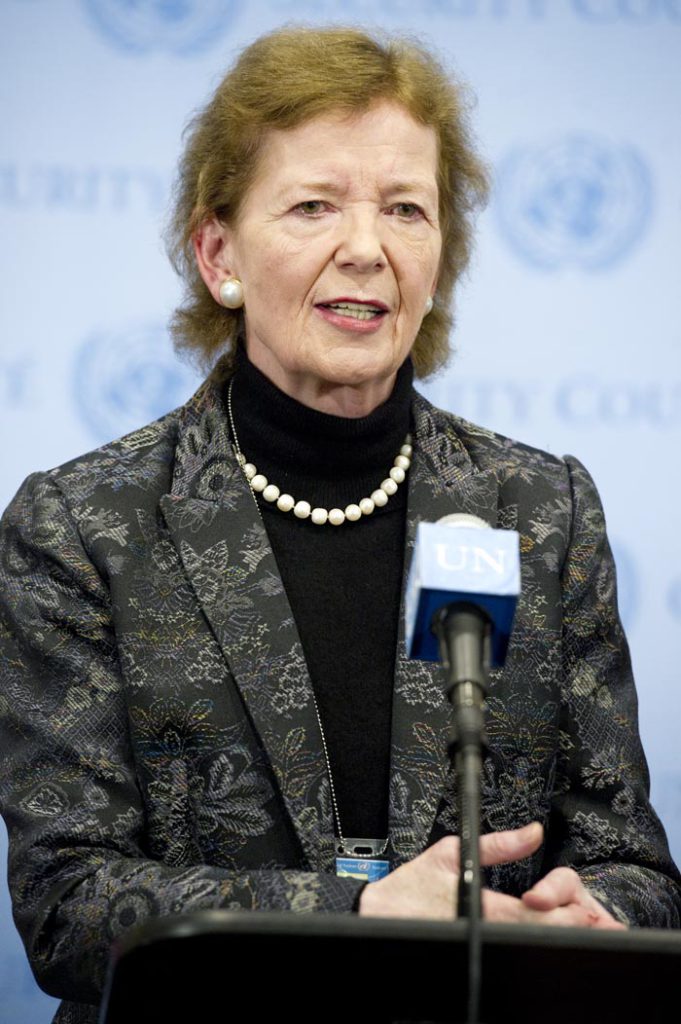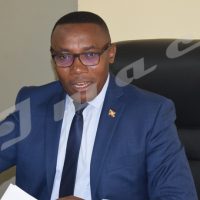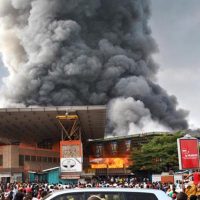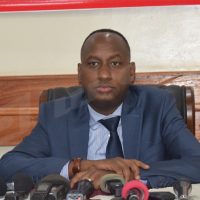‘The Framework of Hope’. That is how Mary Robinson, the former UN Special Envoy to the Great Lakes Region, described the Peace, Security and Cooperation Framework for the Democratic Republic of Congo and the region. It was her job to oversee and encourage the implementation of this comprehensive agreement, with the intent to create sustainable peace in the region. On her departure, Iwacu reviews the work she’s done. Her achievements and set-backs.–By Jojanneke Spoor
In February 2013, Mary Robinson, the former president of Ireland and UN high commissioner for human rights, was appointed Special Envoy to Africa’s Great Lakes region. Her mission: to lead an inclusive political process involving all relevant stakeholders and address the underlying root causes of the conflict.
Mary Robinson is a strong believer in the power of civil society and places specific importance to the role of women and youth. In January of this year, she launched the Great Lakes Women’s Platform, promising to distribute millions in funding to women’s groups across the region. “When civil society demands that governments do what they promised to do”, Robinson said recently in an interview with the UN news agency IRIN. “It can make a difference.”
The Congolese women rights activist Justine Masika Bihamba appreciates Robinson’s efforts. “Civil society and women’s groups are crucial to creating and sustaining peace, but they are usually overlooked in decision making processes.” She feels that heads of states in the region generally don’t want to listen to women, “because they cannot stand hearing the truth.” Robinson took an important first step in this department, but Bihamba warns that “it’s only the beginning. Civil society should be included in all peace negotiations.”
Mary Robinson is widely applauded for her tireless efforts and willingness to contribute to peace in the region, but progress was greatly hampered by political tension and mistrust between certain member states. Kayira Tharcisse, the coordinator of the Congolese NGO ADEPAE, believes that Robinson failed to effectively navigate the interests and mind-set of the main actors in her role as independent mediator. Tharcisse: “The Democratic Republic of Congo thinks that Mary Robinson was more tolerant towards Rwanda than to the DRC.”
Another factor slowing down the progress towards sustainable peace is the fact the Framework does not have a binding nature. There are no sanctions for states that fail to deliver on their commitments. However “there is no Plan B and the countries who signed up to the peace accord must live up to their commitments”, says Joanna Trevor, Oxfam’s country director in the DRC. “It’s as simple as that.”
Late last year, Congolese government leaders signed a peace agreement with M23 rebels, providing in the dissolution of M23 as an armed group and demobilization of the Congolese army. But violence continues in many parts of DRC. Uncertainty over a possible third term for president Kabila adds to increased tension in the region. And it remains unclear how the return of 365,000 Congolese refugees and 2.6 million internally displaced persons will be facilitated.
Robinson, who was recently appointed UN Special Envoy in Climate Change, looks back at her time as Great Lakes Special Envoy with content. In an interview with IRIN, Robinson stated: “There is political will in the region – of that I am convinced – (…), notably in the current chair of the Conference of the Great Lakes, President Dos Santos. He has made it clear and he has repeated it – he wants all negative forces in the eastern DRC removed during his time as chair. (…)We have made progress with the M23, the ADF, and now the FDLR have committed to voluntarily surrendering. If they don’t, they too will face military action.”
While improvements were certainly made, even the seemingly optimistic Robinson is cautious. While speaking to UN Security Council last week, she mentioned that the PSC Framework offers solutions to cycles of conflicts that were decades in the making. “It would not be realistic to expect that solutions would come overnight.”
———————————————————————————————————————————————-
The Peace, Security and Cooperation Framework for the Democratic Republic of Congo (DRC) and the region, was signed on 24 February 2013, by Angola, Burundi, the Central Africa Republic, the Democratic Republic of Congo, Republic of the Congo, Rwanda, South Africa, South Sudan, Tanzania, Uganda and Zambia. Kenya and Sudan joined in January 2014. The framework provides for the establishment of a regional oversight mechanism, involving the United Nations, the African Union, the International Conference of the Great Lakes and the South African Development Community. A Regional Plan of Action was agreed upon in January 2014. It includes promises to respect national sovereignty, stop supporting armed groups and create better justice mechanisms.
The UN Secretary-General appointed the Algerian Said Djinnit as Robinson’s successor. Djinnit is the former Special Representative and Head of the United Nations Office for West Africa (UNOWA). He also served as the Commissioner for Peace and Security at the African Union.




















 IWACU Open Data
IWACU Open Data

